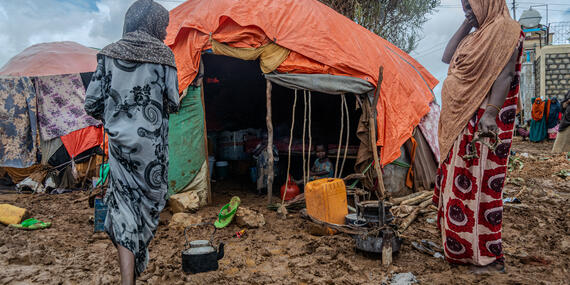Today's top news: Occupied Palestinian Territory, Somalia, Niger

Occupied Palestinian Territory
Sixty-nine thousand litres of fuel entered Gaza from Egypt yesterday. The Israeli authorities have confirmed that they would start allowing the entry of a daily amount of approximately 70,000 litres of fuel from Egypt, which is well below the minimum requirements for essential humanitarian operations. Fuel is set to be distributed by the UN Relief and Works Agency (UNRWA) to support food distribution and the operation of generators at hospitals, water and sanitation facilities, shelters, and other critical services.
Yesterday, UNRWA and UNICEF distributed 19,500 litres of fuel to water and sanitation facilities south of Wadi Gaza, enabling them to operate generators and resume their operation. This fuel is expected to last for about 24 hours.
To the north of Wadi Gaza, all water and sanitation facilities are presumed to be shut down, and no distribution of bottled water has been taking place since the start of the Israeli ground operations on 28 October, raising grave concerns about dehydration and waterborne diseases.
UNRWA has reported that the number of fatalities in the attack that directly hit Al Fakhouri school in Jabalia on 18 November is at least 24 people, with others injured. At the time of the incident, the facility was sheltering about 7,000 internally displaced people.
Somalia
Heavy rains and floods have affected half a million people in the past week alone. This brings the total number of people impacted since the start of floods in early October to 1.7 million.
The number of people displaced also continues to increase and has reached more than 640,000.
According to our partners, at least 41 people have been killed, including 12 children. Roads, bridges and airstrips have been damaged in many parts of the country, hampering the movement of people and supplies and leading to increased prices of basic commodities.
Suspected cases of Acute Watery Diarrhoea and cholera are rising and are expected to further increase.
Our humanitarian partners, the authorities and local communities have stepped up assistance to affected people. More than 740,000 people have received life-saving assistance since October.
Despite the rapidly growing needs, funding for the humanitarian response remains low. With six weeks remaining in the year, the 2023 Humanitarian Response Plan for Somalia is only 40 per cent funded.
Niger
Last week, on 14 November, more than 320 tons of therapeutic nutritional products from the World Food Programme arrived in Niamey as part of trucks transporting humanitarian goods which entered the country through Burkina Faso. This was the first entry of humanitarian goods into the country since 26 July.
More humanitarian aid – including medicines, medical equipment, water and sanitation items and therapeutic foods from UNICEF – is on its way to Niger via Togo and Kaya in Burkina Faso.
This is a welcome development for humanitarian organizations, whose stocks were almost depleted while needs remain high across the country.
In Niger, 4.3 million people need humanitarian assistance, including 3.3 million people who are food insecure, according to the latest food security analysis.
Humanitarian partners are currently working on figures (needs and the response) for 2024 and we will be communicating them towards the end of the year.
